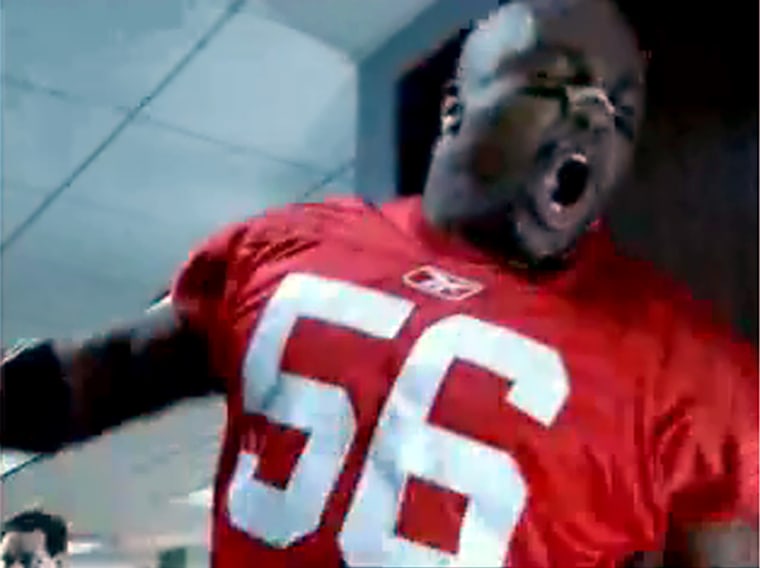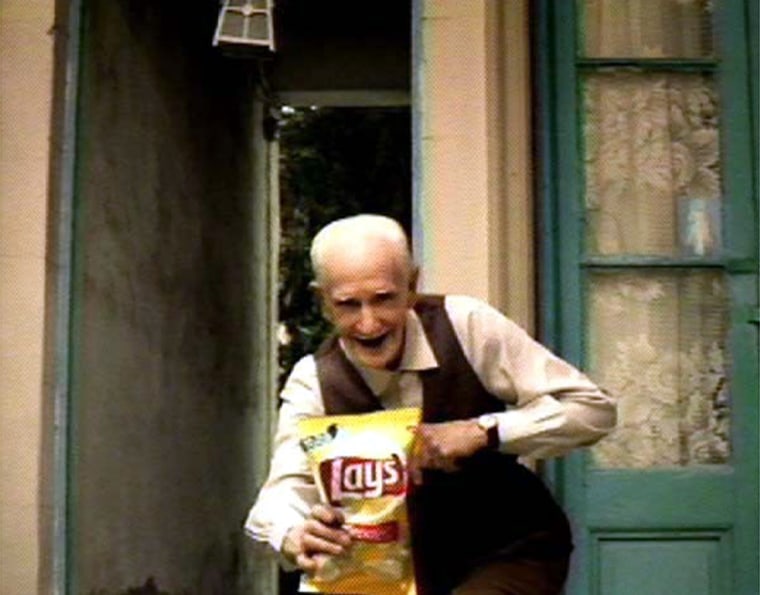These days it seems like celebrities are like cockroaches -- they’re everywhere. But with a few notable exceptions, they won’t be popping up in this year’s Super Bowl commercials. When an average of 140 million people tune into to see the year’s biggest advertising event on Sunday, in addition to watching some football players chasing a ball around the field, they can expect to see a pair of feisty senior citizens fighting over potato chips, real teen-agers talking about their music download problems and a few regular guys dealing with, well, erectile dysfunction disorders.
Even with CBS charging an estimated $2.3 million, for a 30-second spot in Super Bowl XXXVIII, about 10 percent higher than last year, all but two ad slots have been sold during the three-hour game, according to a spokesperson for the network.
Because commercials that air early in the game are considered more effective, demand was so strong for time during the first-half that CBS reportedly moved some of its own network promotions into post-half-time slots.
With such a high-price tag, it’s not surprising that this year’s marketing line-up is a familiar group of heavy-hitters. Anheuser-Busch, the exclusive beer sponsor, has bought five minutes worth of advertising and, as usual, will get the highly coveted first commercial break after kick-off. Pepsi is airing three minutes worth of ads, including its promotional giveaway of 100 milllion free song downloads in partnership with Apple Corp.’s iTunes Web music service. Tournament veteran General Motors will air a 60-second spot featuring Led Zeppelin music as it did during last year’s tournament as well as two other 30-second ads, joined by rivals DaimlerChrysler’s Dodge and Mitsubishi, which each bought one spot.
Other returning players include job Web site Monster, H&R Block, Federal Express and Visa USA.
For Monster, which is returning to the game for the sixth consecutive year, the Super Bowl is a primary part of the Web firm’s $125 million advertising budget. “It’s a one-of-a-kind advertising venue,” said Jeff Taylor, founder of Monster. “Other times, commercials are a disruption for the audience, but during the Super Bowl, people are shushing each other to watch the ads.”

Gillette Co. is back in the game for the first time in a decade with a 60-second commercial intended to update the shaving company’s image. There are a few first-timers scheduled to appear, including the online travel service Expedia, Procter & Gamble’s Charmin and a shootout between two of the new erectile dysfunction drug companies, Levitra from Bayer and GlaxoSmithKline and Cialis, from Eli Lilly and Icos Corp.
Super Bowl newbies and old-timers alike are all hoping to breakthrough the noise of 32 minutes of advertising slotted for the game, or as many as 60 different commercials, in what is the most intensely competitive environment for a TV marketer.
Not only is the Super Bowl the one TV event where many viewers are actually looking forward to seeing the commercials, the audience is also very critical of any message that misses its mark.
An estimated 54 percent of Americans will be watching some part of the game on Sunday and half of those are tuning in to see the ads, according to Insight Express, a research company in Stamford, Conn.
“We’re seeing the Super Bowl growing as a popular culture event,” said Lee Smith, president and chief operating officer of Insight Express, a Stamford, Conn.-based research firm. “Every year slightly more people tune in just to see the commercials.”
Such an ad-friendly crowd also presents huge challenges for marketers.
“This audience is really waiting for the ads; they’re very scrutinizing” said Jeff Mordos, chief operating office for BBDO, agency for a number of Super Bowl advertisers, including Pepsi, Pizza Hut and Federal Express. “This is the kind of environment that can make or break a campaign.”
“The audience is extremely cynical, they’re expecting those commercial to entertain them,” said Kelly O’Keefe, a branding strategist who runs Emergence Labs, Richmond, Va.
But even having an entertaining ad doesn’t guarantee sales success.
One favorite from last year won’t be returning to the game—Terry Tate, the fictional “office linebacker” who tackled slacker co-workers in a hilarious spot for Reebok. The commercial became Web download hit, but didn’t do much for the shoe company’s brand. Instead of coughing up millions for another Super Bowl appearance, this year Reebok is “going in a different direction,” said a company’s spokesman, by debuting a new, four-minute Terry Tate film during half-time at http://www.reebok.com/, and billing it as the “best Super Bowl commercial that won’t be on TV.”
"In order for fans to get the full dose of Terry Tate, we needed to utilize a 4 minute film rather than a :30 or :60 television commercial," said Marc Fireman, global director of interactive marketing for Reebok International.
Last year, flashy Super Bowl ads relied on star power, with Michael Jordan and Jackie Chan hawking Hanes tagless t-shirts and the Osbournes for Pepsi Light. For this year’s marketers, it’s the power of real people and cool music.
While there will be a few famous faces — H&R Block brings back country singer Willie Nelson, well-known for his income-tax woes, and IBM uses former heavyweight champ Muhammad Ali in a commercial promoting the Linux computer programming system — this year’s commercial crop is relatively celebrity-free.
“Brands are pulling back on celebrities,” said O’Keefe. “What often happens is, it ends up being more about the celebrity than the brand.”
Pepsi, which usually goes for big-name spokespeople like Britney Spears and Beyonce, instead features real teenagers who were sued by the recording industry for illegally downloading music from the Internet as part of its Pepsi giveaway with Apple’s iTunes. The commercial includes a version of “I fought the law” by Green Day.
Monster shows regular folks on their way to work or job interviews, accompanied by a remixed version of the disco hit “I feel love” and an obscure song from the British pop band The Cure.
Visa, which used athletic stars Yao Ming and Yogi Berra in a comic commercial during last year’s tournament, is instead breaking a new branding ad starring some no-name types.
More important than famous faces is giving the tough Super Bowl audience something unexpected, ad experts say.
“The surprise factor is very, very important,” said Mordos. “You’re going to see lots of new ideas for all these companies being thrown out to the public for the first time.”
